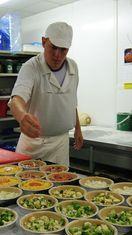
Revised apprenticeships from Improve are set to provide the food and drink manufacturing industry a fresh injection of new talent.
Working in close consultation with employers, Improve, the food and drink sector skills council, has revised apprenticeships to make them more attractive, more cost-effective and better geared to the needs of the industry. From November, separate apprenticeships for bakery, meat and poultry processing and food and drink manufacture will be replaced by a single, flexible framework offering the chance to specialise in any of the industry’s sub-sectors.
It is forecast that the new framework will result in new apprentice numbers rising, from the 400 anticipated next year, to more than 2,000 in 2012; a five-fold increase that will be vital to addressing key skills shortages and falling numbers of young recruits in the UK’s largest manufacturing sector.
Key changes to the framework include the introduction of a modular system of study and assessment allowing apprentices to work towards a technical diploma and a National Vocational Qualification (NVQ) in easy-to-manage, bite-size chunks. The emphasis of the apprenticeships is on work-based learning, which will give a direct link between theory and practical skills needed to do a particular job. There is also a clear continuity in learning between the two levels of study, while the large number of learning units available allows each apprenticeship the flexibility to be adapted to meet the skills demands of any job in the industry.
“It is vital all apprentices have a broader theoretical understanding of a particular job on top of the actual skills required to do it,” said Jack Matthews, chief executive of Improve. “But we know time spent out of work is a concern for employers, something which has contributed to low uptake at the higher level. By allowing apprentices to work towards their qualifications in smaller, easy-to-manage steps, we can strike a better balance between theory and practice while class time and workload are kept to a minimum.
“With more than 500 units covering all aspects of the industry to choose from, each apprenticeship can be geared towards a specific job, be it a specialist area like craft bakery or butchery, or something more generic like production line management. All apprentices will also be taught core skills relevant across the industry, for example food hygiene and business skills, as well as basic skills in numeracy, literacy and communication. This means they qualify capable of multi-tasking, switching roles and moving easily into other areas of work within the sector.”



No comments yet